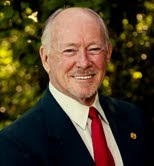 W. B. Yeats is my favorite poet. His poetry touches the mystical and dreamworlds that I sense as well, and here, in today's The Writer's Almanac, is the explanation for his inner pain that gave birth to some of his best work. I feel this, knowing this about him. Find someone you love desperately, and she is there, just out of reach. The emptiness borne of her withdraw in this case gave birth to these famous, poignant, unforgettable lines. Here's the article:
W. B. Yeats is my favorite poet. His poetry touches the mystical and dreamworlds that I sense as well, and here, in today's The Writer's Almanac, is the explanation for his inner pain that gave birth to some of his best work. I feel this, knowing this about him. Find someone you love desperately, and she is there, just out of reach. The emptiness borne of her withdraw in this case gave birth to these famous, poignant, unforgettable lines. Here's the article:It's the birthday of the woman who inspired this verse by W.B. Yeats: "Had I the heavens' embroidered cloths, / Enwrought with golden and silver light, / The blue and the dim and the dark cloths / Of night and light and the half light, / I would spread the cloths under your feet: / But I, being poor, have only my dreams; I have spread my dreams under your feet; Tread softly because you tread on my dreams."
That's Maud Gonne whom W.B. Yeats (books by this author) was addressing; she was born in Surrey, England, on this day in 1865, just six months after Yeats was born in Dublin. They first met when they were each 25 years old. Yeats later referred to the day he met her as "when the troubling of my life began."
She was an Irish revolutionary, independent-minded, graceful, and reared in affluence. She was tall, red-headed, and exquisitely beautiful. In his Memoirs, Yeats wrote: "I had never thought to see in a living woman such great beauty. It belonged to famous pictures, to poetry, to some legendary past. A complexion like the blossom of apples, and yet face and body had the beauty of lineaments which Blake calls the highest beauty because it changes least from youth to age, and a stature so great that she seemed of a divine race." She wore long black dresses and she kept singing birds as pets.
He asked her to marry him over and over again. She refused, over and over again. She once told him: "You would not be happy with me. ... You make beautifully poetry out of what you call your unhappiness and you are happy in that. Marriage would be such a dull affair. Poets should never marry."
In a letter to him in 1911, she wrote, "Our children were your poems of which I was the father sowing the unrest & storm which made them possible & you the mother who brought them forth in suffering & in the highest beauty."
Yeats wrote about her:
When you are old and grey and full of sleep,
And nodding by the fire, take down this book,
And slowly read, and dream of the soft look
Your eyes had once, and of their shadows deep;
How many loved your moments of glad grace,
And loved your beauty with love false or true,
But one man loved the pilgrim soul in you,
And loved the sorrows of your changing face;
And bending down beside the glowing bars,
Murmur, a little sadly, how Love fled
And paced upon the mountains overhead
And hid his face amid a crowd of stars.





No comments:
Post a Comment